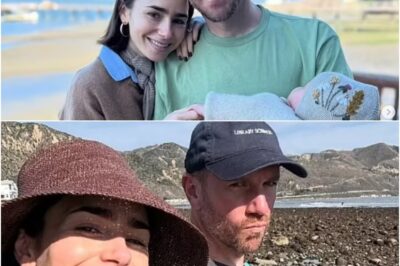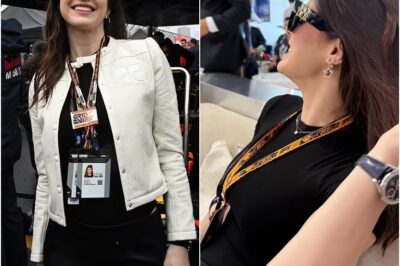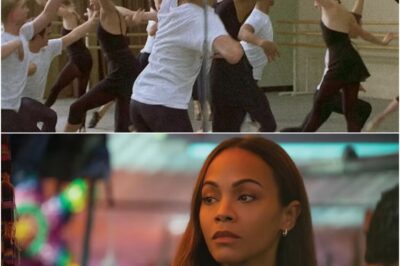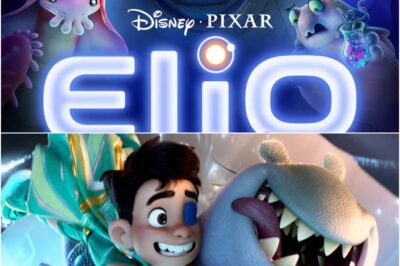shows side-by-side images of music superstar Taylor Swift and a Coca-Cola sign.
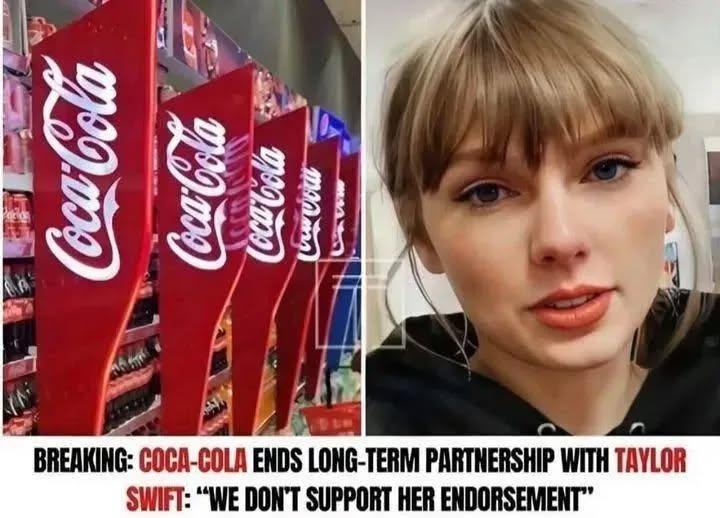
“Coca-Cola Cuts Ties With Taylor Swift Over Harris Endorsement, ‘We Don’t Support Her Endorsement,’” the post’s caption reads in part.
The post was shared more than 1,800 times in three days.
Versions of the Claim while that claim originated on an account that shares satirical content and identifies it that way, the Facebook post presents it as an authentic development.
with the pop star. While that claim originated on an account that shares satirical content and identifies it that way, the Facebook post presents it as an authentic development.
it shares satirical content and that “nothing on this page is real.” The post’s caption identifies it as satire, and its image contains two watermarks indicating that
Democrat, in his unsuccessful bid for a U.S. Senate seat won by Republican Marsha Blackburn.
Misinformation about Swift’s political activism is not uncommon. USA TODAY previously debunked false claims that the
Coca-Cola’s decision to terminate its long-standing partnership with global pop sensation Taylor Swift sent shockwaves through both the entertainment and business worlds yesterday.
The beverage giant, which had maintained a relationship with the singer for over a decade, released a terse statement confirming the end of their collaboration, leaving fans and industry insiders scrambling for details.
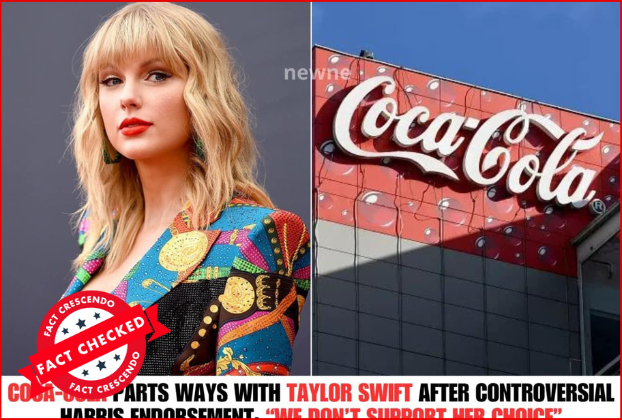
“After careful consideration, Coca-Cola has decided to conclude our partnership with Ms. Swift,” the statement read.
“While we appreciate her contributions to our brand over the years, recent developments have led us to reevaluate this relationship. We do not support certain choices and positions she has taken that no longer align with our company values and vision for the future.”
The announcement comes amid growing tension between Swift and several corporate sponsors following her increasingly vocal political stances and public feuds with other high-profile figures.
Sources close to the situation suggest that executives at Coca-Cola had been concerned about the polarizing nature of Swift’s recent public comments and the potential impact on their global consumer base.
Industry analysts point to Swift’s recent documentary and social media campaign as potential flashpoints that may have contributed to the company’s decision.
The singer has become increasingly outspoken on issues ranging from climate change to political endorsements, positions that sometimes conflict with the more neutral stance preferred by major international corporations like Coca-Cola.
Financial experts estimate the dissolution of this partnership could represent a significant financial hit for both parties.
Swift’s deal with the beverage company was reportedly worth upwards of $26 million annually, while Coca-Cola benefited tremendously from access to Swift’s massive and dedicated fan base, particularly among the coveted 18-34 demographic that marketers prize.
Swift’s representatives have remained notably silent since the announcement, declining multiple requests for comment.
This unusual quiet from the typically media-savvy star has only fueled speculation about the circumstances behind the split, with some industry insiders suggesting that negotiations to salvage the relationship had been ongoing behind the scenes for months before finally collapsing.
Social media erupted immediately following the news, with the hashtags #CokeCancel and #TaylorSwiftBoycott trending worldwide within hours.
Swift’s dedicated fan base, known collectively as “Swifties,” have launched organized campaigns against Coca-Cola products, while others have applauded the company for what they perceive as taking a principled stand.
The beverage company’s stock experienced unusual volatility in the wake of the announcement, initially dropping nearly 3% before recovering slightly by market close.
Marketing experts suggest this reaction demonstrates the double-edged nature of celebrity endorsements in today’s politically charged environment, where brands must carefully navigate complex social issues.
Former Coca-Cola executive Maria Hernandez, who previously oversaw celebrity partnerships for the company, expressed surprise at the public nature of the split. “Typically, these relationships end much more quietly, with contracts simply not being renewed.
The explicit statement from Coca-Cola suggests something more significant occurred behind the scenes that necessitated a clean break.”
Swift’s other major corporate partners, including Capital One and Apple, have thus far maintained their relationships with the singer, though industry observers are watching closely to see if Coca-Cola’s decision might trigger a domino effect among other brands concerned about potential controversy.
The partnership, which began when Swift was still primarily known as a country artist, had evolved considerably over the years.
From featuring in commercials during her “Red” era to limited edition cans during the “1989” world tour, Swift had become closely associated with the Coca-Cola brand, particularly among younger consumers.
Marketing professor Dr. James Wilson of Northwestern University noted that this split represents a significant shift in celebrity endorsement strategies.
“Companies are increasingly weighing the benefits of star power against the potential backlash from consumers who disagree with celebrities’ personal views. The era of brands remaining apolitical while partnering with outspoken celebrities may be drawing to a close.”
Swift’s fanbase has demonstrated remarkable loyalty throughout previous controversies, often mobilizing in her defense across social media platforms and through consumer choices.
Early indications suggest this situation will be no different, with fan groups organizing “Coca-Cola pours” where they publicly dispose of the company’s products in solidarity with the singer.
The timing of the announcement has raised eyebrows, coming just weeks before Swift is set to release her next studio album and announce dates for her highly anticipated world tour.
Some industry insiders speculate that Coca-Cola may have timed the announcement to maximize disruption to Swift’s promotional plans, though company representatives have denied any such strategic timing.
Competing beverage companies have thus far avoided commenting publicly on the situation, though marketing insiders suggest several may be quietly exploring the possibility of approaching Swift with alternative partnership offers.
Pepsi, in particular, has a history of capitalizing on celebrity splits with Coca-Cola, most famously with their signing of Michael Jackson in the 1980s after his departure from Coca-Cola.
Swift’s previous controversies have typically resulted in commercial success, with the singer often channeling public disputes into chart-topping songs and record-breaking album sales.
Whether she will address the Coca-Cola situation directly in her upcoming music remains to be seen, but her history suggests the possibility cannot be ruled out.
Consumer behavior experts are divided on the long-term implications for both parties.
While Swift’s influence among young consumers is undeniable, Coca-Cola’s global reach and century-long brand development may insulate it from significant damage.
Early polling suggests consumer reaction is largely splitting along existing lines of Swift fandom rather than creating new converts to either side.
The beverage giant has not yet announced plans for redirecting the substantial marketing budget previously allocated to the Swift partnership, though speculation about potential replacement celebrities has already begun circulating within industry publications and on social media platforms.
This development marks the latest chapter in what has been a transformative period for celebrity endorsements in the digital age.
As stars increasingly use their platforms for advocacy beyond their primary artistic endeavors, companies face complex decisions about the benefits and risks of these high-profile partnerships in an era where consumer loyalty can shift rapidly based on perceived values alignment.
News
BREAKING: Lily Collins’ EMOTIONAL 36th Birthday—‘First as a Mama!’ Shares RARE Photos of Baby Tove & Husband Charlie!
Lily Collins celebrated her ‘first birthday as a mama’ as she turned 36 on Tuesday – and shared sweet family snaps…
BREAKING: White Lotus Star Alexandra Daddario TURNS HEADS at Australian Grand Prix—VIP Photos LEAKED
Alexandra Daddario flaunted her luxurious life at the Formula One Grand Prix in Melbourne. The White Lotus star, 39, was pictured on the grid…
I’m Convinced Alexandra Daddario Is The Perfect Casting Choice To Play Wonder Woman In James Gunn’s DCU
Alexandra Daddario has all the needed elements to bring Wonder Woman to life in the new DC Universe and make her performance as memorable…
Zoe Saldaña Says Oscars Rejecting ‘Avatar’ Acting Is ‘Quite Deflating’: ‘You’re Overlooked and Then Minimized and Completely Disregarded’
Zoe Saldaña, the acclaimed actress known for her roles in blockbuster franchises like Avatar and Guardians of the Galaxy, has never been one…
BREAKING: Zoe Saldaña’s FORGOTTEN Ballet Movie DESTROYS Her Oscar Role—Fans SCREAM ‘This Is Her REAL Masterpiece!’
Emilia Pérez is not the first time Zoe Saldaña has danced on screen, and her ballet performance in Center Stage showcased her musical…
BREAKING: Pixar’s NEW Movie Trailer LEAKED—Starring Oscar-Winning SUPERSTAR! Fans SCREAM ‘BEST ANIMATION EVER!’
After winning the Oscar for Best Supporting Actress for her performance in Emilia Pérez, Zoe Saldaña’s next movie will be the Pixar sci-fi movie Elio….
End of content
No more pages to load

